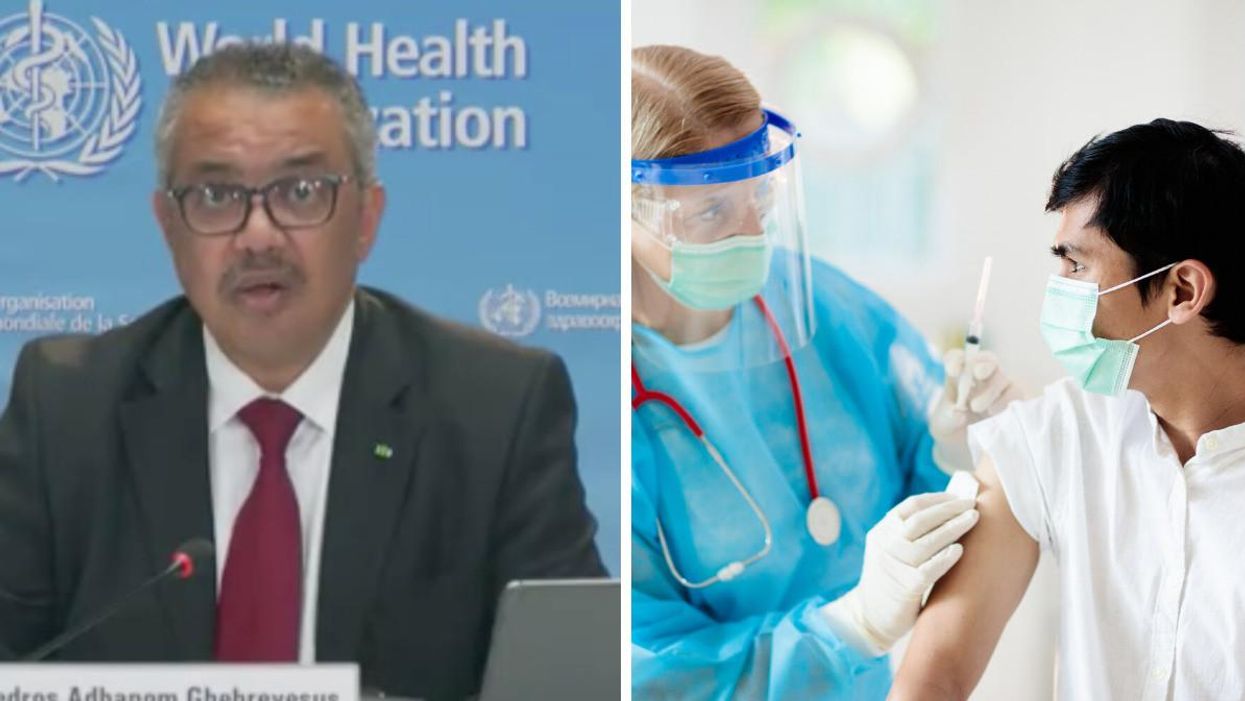The WHO Says Long COVID Needs An 'Urgent' Plan & New Numbers Reveal Just How Common It Is
The effects can linger for years.

WHO Director-General Tedros Adhanom Ghebreyesus during a media briefing. Right: Person getting a vaccine.
The World Health Organization (WHO) is calling for critical action to help people living with long COVID, after a new study revealed the best look yet at just how often it happens to people.
WHO director-general Dr. Tedros Adhanom Ghebreyesus called out the governments of the world in an op-ed for The Guardian, in which he pointed to the devastating impact that long COVID can have on people's lives.
\u201cEarly in the #COVID19 pandemic, it was important for health systems to focus all of their life-saving efforts on patients presenting with acute infection. Now it's critical for governments to invest long-term in their health system & make a plan for dealing with #LongCovid.\u201d— Tedros Adhanom Ghebreyesus (@Tedros Adhanom Ghebreyesus) 1665576586
Tedros also called for a "long-term plan" to deal with the problem.
"While the pandemic has changed dramatically due to the introduction of many lifesaving tools, and there is light at the end of the tunnel, the impact of long COVID for all countries is very serious and needs immediate and sustained action equivalent to its scale," he writes in his op-ed.
Also on Wednesday, the Institute for Health Metrics and Evaluation (IHME), along with the WHO, revealed through a study that 17 million people in Europe experienced long COVID in the first two years of the pandemic (2020 and 2021). That’s a 307% increase in cases identified from 2020 to 2021.
None of these numbers even include information from low and middle countries, which the WHO says is needed to fully understand the bigger picture.
The new large-scale Scottish study, published in Nature Communications on Wednesday, found that about 6% of the patients monitored had not recovered six to 18 months after infection, and about 42% of the patients had only partially recovered.
The report also found that long COVID can directly or indirectly impact a person’s mental health and daily activities. Women were also twice as likely to experience long COVID compared to men, the study found.
Still according to the joint study from the IHME and the WHO, most people who develop COVID-19 fully recover, but an estimated 10-20% of people develop a variety of long-term effects like "fatigue, breathlessness, and cognitive dysfunction," which can include confusion, forgetfulness or lack of mental focus. These are symptoms they may have to deal with for years to come.
“We are hearing stories of so many individual tragedies, of people in financial crisis, facing relationship problems, losing their jobs, and falling into depression,” Dr. Hans Henri P. Kluge, WHO regional director for Europe, said in the joint report.
As for who can develop the post-COVID condition, the health organization says it can happen to anyone and it can develop even after a person has recovered.
Tedros says governments can fight long COVID through a variety of ways, including the continued effort to hand out vaccines.
This article's right-hand cover image was used for illustrative purposes only.
Health Canada has a robust website with all the latest information on COVID-19 vaccines and can answer any questions you may have.